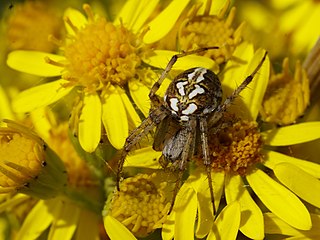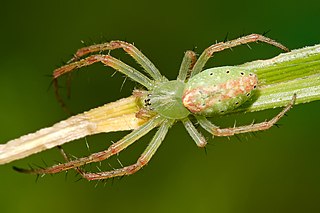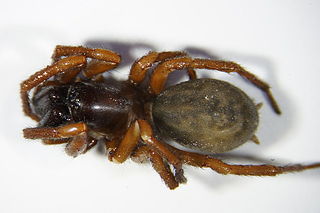Plexippoides is a genus of jumping spiders that was first described by Jerzy Prószyński in 1984. The name means "having the likeness of Plexippus"

Synagelides is a genus of Asian jumping spiders that was first described by W. Bösenberg & Embrik Strand in 1906. This genus and Agorius are separated as a genus group, sometimes called subfamily Agoriinae, but more recently downranked to tribe Agoriini of the Salticoida clade in subfamily Salticinae.

Cyclosa, also called trashline orbweavers, is a genus of orb-weaver spiders first described by Anton Menge in 1866. Widely distributed worldwide, spiders of the genus Cyclosa build relatively small orb webs with a web decoration. The web decoration in Cyclosa spiders is often linear and includes prey remains and other debris, which probably serve to camouflage the spider. The name "Cyclosa" comes from Greek 'to move in a circle', referring to how it spins its web.

Neoscona, known as spotted orb-weavers and barn spiders, is a genus of orb-weaver spiders (Araneidae) first described by Eugène Simon in 1895 to separate these from other araneids in the now obsolete genus Epeira. They have a mostly pantropical distribution and one species, Neoscona adianta, has a palearctic distribution. As of April 2019 there are eight species that can be found in the United States and Canada:

Cyrtophora, the tent-web spiders, is a genus of orb-weaver spiders first described by Eugène Simon in 1895. Although they are in the "orb weaver" family, they do not build orb webs. Their tent-like, highly complex non-sticky web is sometimes considered a precursor of the simplified orb web. These webs are aligned horizontally, with a network of supporting threads above them. These spiders often live in colonies. Females have a body length of mostly about 10 millimetres (0.39 in) long. Some members, including Cyrtophora cicatrosa, exhibit the ability to change colour rapidly.

Clubiona is a genus of sac spiders that was first described by Pierre André Latreille in 1804.
Pireneitega is a genus of funnel weavers first described by Kyukichi Kishida in 1955.

Sinopoda is a genus of Asian huntsman spiders that was first described by Peter Jäger in 1999.

Larinia is a genus of orb-weaver spiders first described by Eugène Simon in 1874.

Coelotes is a genus of funnel weavers first described by John Blackwall in 1841. A large number of species are found throughout Europe and Asia.
Eriovixia is a genus of orb-weaver spiders first described by Allan Frost Archer in 1951.

Lysiteles is a genus of Asian crab spiders first described by Eugène Simon in 1895.

Phrurolithus is a genus of araneomorph spiders first described by C. L. Koch in 1839. First placed with the Liocranidae, it was moved to the Corinnidae in 2002, then to the Phrurolithidae in 2014.
Draconarius is a genus of Asian funnel weavers first described by S. V. Ovtchinnikov in 1999.










